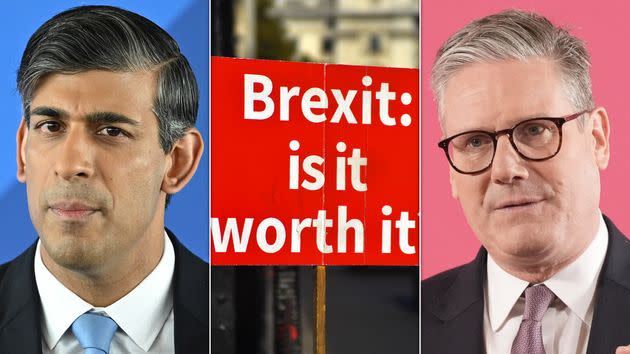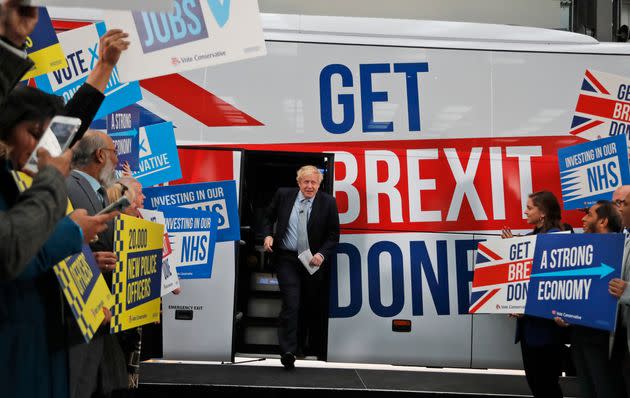What Happened To Brexit? How 1 Word Has Disappeared From This Year's Election Campaigns

Brexit seems to be out of the spotlight this year, demoted from the talk of the town at the last election to now barely featuring on the agenda.
How and when the UK left the EU was a core issue for voters throughout the 2017 and 2019 general elections, but now it has actually happened, politicians appear to be keen for the public to move on.
And it’s not unusual for such tricky topics to be cast aside in an election campaign.
But what about the ongoing effects this seismic departure has had on the country?
After all, the next government will have to talk to the EU in 2026 when the UK-EU free trade deal is scheduled to be reviewed.
As broadcaster Piers Morgan claimed, Brexit has become the “great unmentionable” in the run-up to this general election.
Here’s why it still matters.
Why are the Conservatives not talking about Brexit?

The Conservatives campaigned on the slogan, “Get Brexit done,” in 2019, and secured a landslide victory as a result, with an 80-seat majority in the Commons.
And though it supposedly was a great success for the government, the party now seems determined not to talk about it much at all.
Rishi Sunak, who campaigned to Leave, has only claimed the Conservatives “seized the opportunities of Brexit”, increasing the UK’s competitiveness and allowing greater NHS investment.
But for the most part, the Tories do not want to discuss it in detail – probably because so many Brexit promises failed to deliver.
Famous slogans, such as giving the NHS an extra £350m per week, seem to have evaporated – and any such reminder of this disaster risks pulling the Tories even further down in the polls.
Why are Labour not talking about Brexit?
Keen Remainer Keir Starmer has made it clear he does not want to rejoin the EU, but has promised to “make Brexit work” and help strengthen the UK’s relationship with the trade bloc once again.
But back in 2019, he pushed for a second referendum.
Labour’s change of heart appears to come from its ongoing bid to win back Red Wall voters who supported Conservative last time, when the Tories stood a pro-Brexit manifesto.
Starmer will therefore want to avoid appearing too anti-Brexit – a reputation which meant Remainer Theresa May struggle to hold her spot in No.10.
Labour are also leaps and bounds ahead in the polls, and saying anything too controversial at this point risks damaging that healthy lead.
They may not be able to keep quiet on Brexit for long, though, especially if they get into government.
Pollsters at the More In Common think tank say only 18% of voters know or believe in Starmer’s position on EU-UK relations – and 30% think Starmer wanted to either rejoin the bloc or rejoin the single market.
As Mike Galsworthy, chair of the European Movement UK, told POLITICO: “Labour cannot simply ignore that vast pro-European base that backed them to win power.
“Yes, there will be expectations — and try as they might to ignore it, those expectations will be firmly there.”

Is anyone else talking about it?
Yes – all of the smaller parties have mentioned it.
The Liberal Democrats’ manifesto cautiously says rejoining the EU was a “longer term objective”.
The Scottish National Party (SNP) have also said they would rejoin the EU, something the Green Party echoed if the political conditions are correct.
Meanwhile, Reform UK, formerly the Brexit Party, wants to renegotiate the current deal.
Interestingly though, party leader Nigel Farage has not made the departure of the EU a core part of his schtick since launching his party’s campaign, even though he spent decades pushing Eurosceptic sentiment.
Why do we need to speak about Brexit?
While the impact of Brexit can be hard to unpick from other seismic events like the Covid pandemic, Liz Truss’s disastrous mini-budget, and the Ukraine war, some stats have repeatedly have blamed our EU departure for certain UK struggles.
The Office for Budget Responsibility (OBR) said Brexit has made the economy 4% smaller than it may have been without leaving the EU.
The Economist newspaper said trade barriers saw 10% fewer goods exported since 2019.
And, according to a separate Cambridge Econometrics report from January this year, Brexit shrunk the economy by almost £140billion, and the average Brit was nearly £2,000 worse off last year because of the EU departure.
The impact on NHS workers has also made headlines, as leaving the EU worsened the staff shortages within the health service and possibly lengthened waiting times.
What impact could Brexit have on this general election?
Yes, the referendum may have been eight years ago, but the disillusionment it created among voters remains.
As UK in a Changing Europe found last autumn, nearly 60% respondents who voter to Remain said they were very or somewhat dissatisfied with democracy in this country, compared to 45% of those who voted Leave.
And, contrary to what the Tories have claimed, YouGov found that only three in 10 Brits believe Brexit is “done” – that includes 45% of Leave voters.
To make matters worse for the Conservatives, 72% of the respondents said the EU exit has been handled badly by the government – and 62% say it has been more of a failure than a success.
Meanwhile, 46% of voters say there should be another EU referendum in the next decade, while 36% say there should not be.
Starmer may have ruled out rejoining, but this poll suggested that out of those who plan to vote Labour, 69% say there should be another vote in 10 years – 63% want one within the next five years.
And clearly it is not an issue which is going to go away – the pollster also concluded that 50% of overall voters would back rejoining the EU, compared to 30% who would want to stay out.

